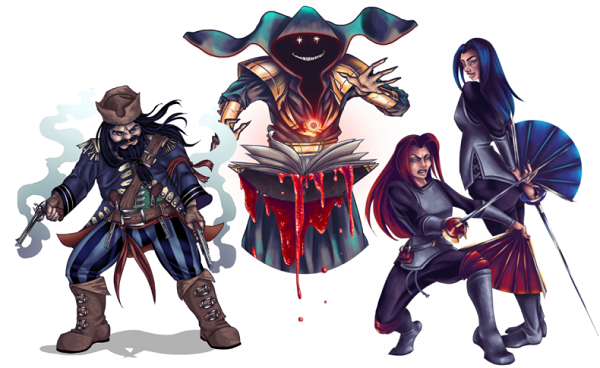ST Forge: 3 Tips for Running an Exciting Origin Campaign
ST Forge is a weekly series to help Storytellers and Game Masters improve their craft and learn new ways to engage their players. Last time, we talked about adding new players to the table!
Apprentice level games have been around since the creation of tabletop roleplaying games, and year-after-year new storytellers gather new faces to begin their journey. If we are not starting games at the apprentice level, more often than not, we skip ahead a few levels (like 3rd level to be precise) so we can cut right to the exciting action.
Exciting action and character customization need not be gated behind level requirements, and an origin campaign can be nail-bitingly tense. Here is how! The biggest reason to do an apprentice campaign, is a focus on character over class. It’s a recommended short-story for any GM that run with a focus on backgrounds, family, love interests, and character depth. If you are just doing convention store pick-up games, apprentice games probably aren’t for you—unless it’s a horror game
We all come from somewhere. Even if we are diabolical.
Image Credit: A Touch More Class
Set the stakes high from the start
Your PCs should feel like they have something to lose from moment one. This could be as simple as making the first session revolve around a life-or-death situation. If your group is used to playing with high stakes, then make sure everyone starts on equal footing. No one likes it when the new guy gets all the spotlight because he’s playing a cleric and knows how to turn undead. This is something that can be difficult in a large group, but it’s important to try. One way to do this is by giving each PC their own mini arc that ties into the main story. This gives everyone a chance to shine and feel like their contribution matters. Another way to ensure everyone is involved is by using scenes where only certain PCs can take part.
Additionally, this allows you time to focus on specific characters without ignoring the others. No one likes playing a game where they can’t fail, so make sure there are real stakes involved. This doesn’t mean that every encounter should be deadly, but it does mean that there should be meaningful repercussions for failure. For example, if your PCs are trying to sneak into a heavily guarded fortress, let them know that getting caught will result in them being thrown into the dungeon instead of just being sent back to try again. This will make players think twice before taking unnecessary risks.
Build tension through foreshadowing
This is a great tool for setting up future events and making sure your players are invested in what’s going on. By dropping subtle (or not so subtle) hints about what’s to come, you can get players guessing and speculating about what’s going to happen next. Just make sure you don’t overdo it or they’ll figure out your plans long before they come to fruition!
One way to achieve this is to stay classless. Make sure your players are making characters, not classes, is the second bit of advice. Even if you want to end up a Tremere or a Barbarian, your character is level 0 and hasn’t really gotten the training they need yet. It’s important as a GM that you keep classes and class requirements out of your apprentice level campaign. Don’t pair the fighter up with the fighter teacher just yet, save that for when they graduate to level one. Instead, have a variety of teachers and options present themselves to the characters during their adventure. Perhaps even some that are more forbidden or restricted…
Characters change the moment gameplay starts. Offering up a Blackguard teacher or a Death Domain Cleric to a level zero character has an interesting appeal to it, even if that player had wanted to play a wizard, they may change on a dime mid-game. Which becomes vastly more compelling if they built a real fleshed out individual instead of a block-of-stats for an optimized class. I recall one player who desired to play a Bard, until he found that he really disliked Bards after all—and instead became the world's most charismatic monk and loved his character. This is one of the best reasons to run an apprentice level campaign I feel, as it gives your players time to grow into their characters.
Don’t be afraid to kill PCs.
This might seem like counterintuitive advice, but hear me out! No one wants their character to die, but it can actually be a good thing for the story. It raises the stakes and shows that no one is safe, which can make for some very tense moments. Just make sure you give players a fair warning before killing their characters so they don’t feel like you’re being unfair!
All game-systems we play in are based off imagination and getting killed in any RPG is hardly the end of the story. Even in games like Legend Of The Five Rings, that have no resurrection mechanics, allow you to pass your Daisho onto the next in line. As a GM, you can rule that instead of a true total party kill, perhaps they spent months in a coma—which serves as a segway to why they must leave home and quest. Whatever the case may be, don’t cradle your apprentices, just let the dice fall where they will and storytell around them.
With these tips, you should be well on your way to running an exciting origin campaign that will have your players on the edge of their seats! Just remember to keep the stakes high, involve everyone in the story, and don’t be afraid to kill off some PCs if it serves the story!
Here is the spot I ask you to share this article if you’ve enjoyed it. Because…well…have to ask at some point!
Enjoy the ST Forge series? Sarcastic fantasy about the end of the world? Subscribe to the mailing list and get a monthly bundle of these articles delivered so you don’t miss out! Click Here!
Featured Image: A Touch More Class


